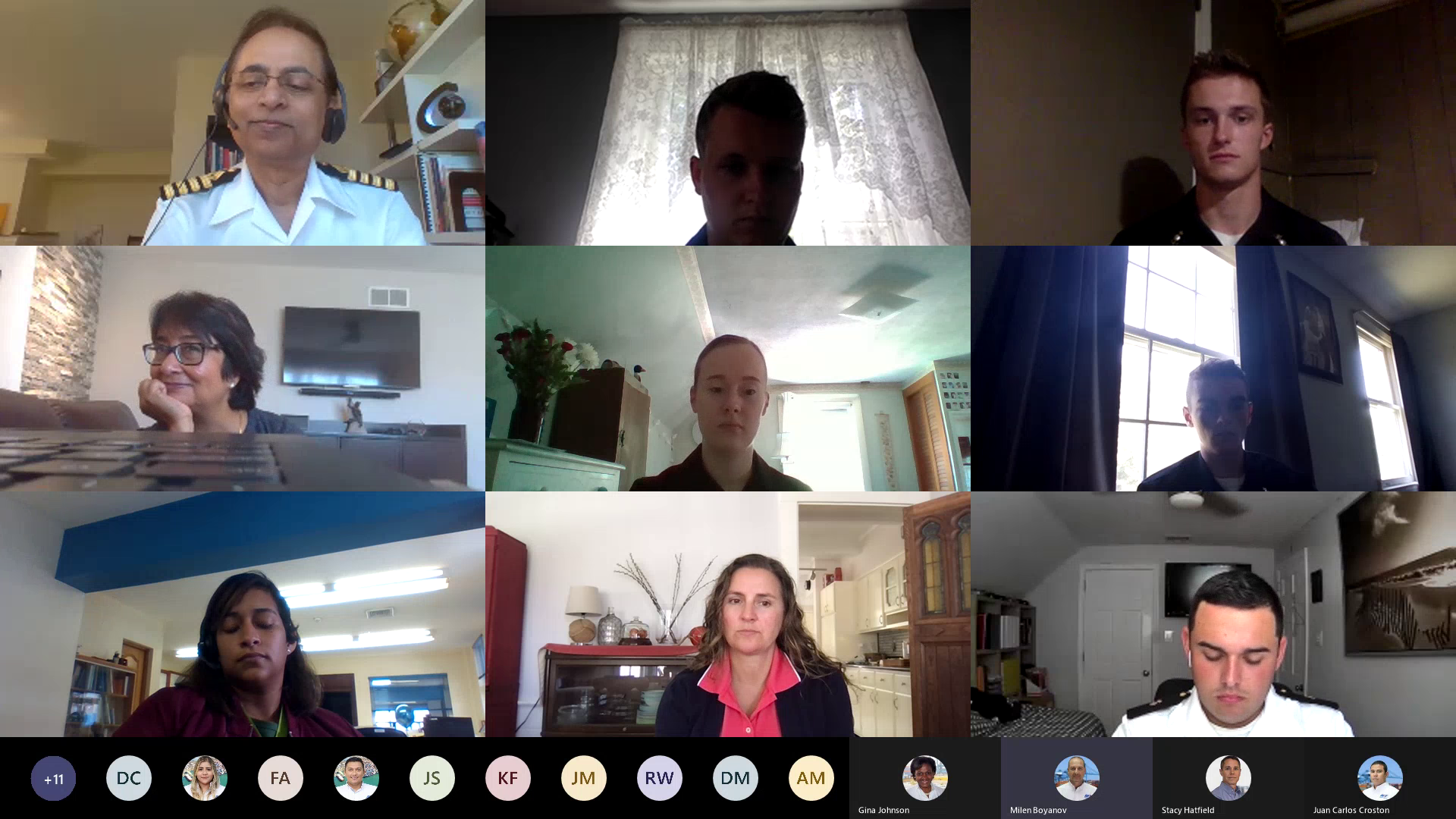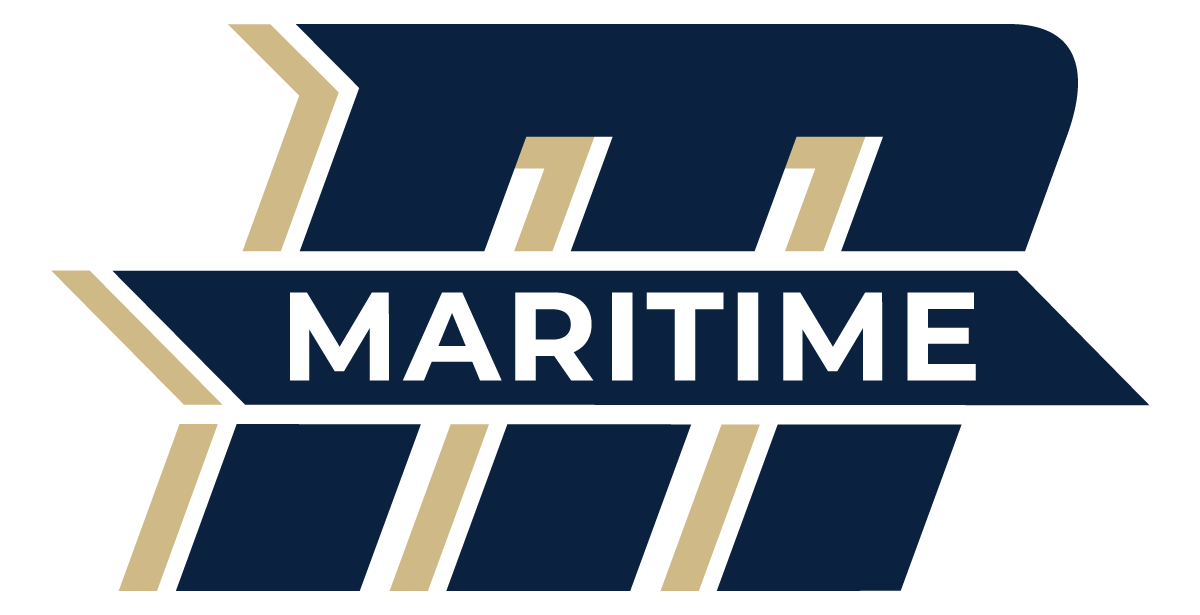
For the past four weeks (May 24th – June 18th) a group of 16 cadets of the International Maritime Business major (IMB) have participated in the IMB Summer 2021 Experiential Learning led by Captain Pandey, and 2/C cadet Alex Barrachina Long. Unlike the past, this Experiential Learning was held in a fully remote format. Traditionally, cadets would travel abroad to physically visit companies like container terminals, shipyards, and other industry related companies.
Due to the Covid-19 global pandemic and all the travel restrictions, a new type of Experiential Learning has been created. Participating cadets have been contracted as consultants for companies opposed to going to visit them. The recent Experiential Learning consisted of daily sessions via virtual meetings, along with time offline to conduct research and work on all the deliverables. Many cadets were disappointed that they would not be able to travel abroad and instead have another online experience, but many were surprisingly satisfied by this experience. Cadet Kyle Fortune shared that he was “bummed out to do Experiential Learning online, but it was an excellent project where he felt important and connected via this format he was not that excited for”.
This consulting engagement was between the Experiential Learning Cadets and Manzanillo International Terminal in Panama (MIT Panama). Due to the upcoming required International Maritime Organization (IMO) emission reductions, MIT Panama was desperate to figure out what their annual emissions where, and what they can do to reduce and eventually eliminate all their GHG Emissions. Cadet Dallas Marroco shared “I thought it was awesome to actually work on a real project and get to speak with the chairman and executives of an actually company. All my friends at other universities haven’t been provided incredible opportunities like this”. Since cadets received actual data from MIT Panama, all students were required to sign an NDA Agreement (non-disclosure agreement) a legal document requiring cadets to treat the data with confidentiality.
While the main goal of this consultancy project was to calculate the GHG Emissions and provide solutions to reduce emissions, it also acted as an incredible networking experience with not just workers in the industry but also industry executives and innovators. The first two weeks were focused on mostly education and some research on what GHG emissions were and how to calculate them. Virtual meetings included presentations by all the MIT Panama departments, presentations by many industry experts and lectures by Captain Pandey. The image above is Frank Kho who gave an incredible presentation on new tech & automation, what ports in Europe are doing regarding emission reduction, and lastly, he gave suggestions on some of the equipment we should consider researching for MIT Panama.
To be able to provide MIT Panama with the most amount of knowledge possible, the Experiential Learning cadets were split up into four groups with a specific research category, and each group was responsible for calculating MIT’s total GHG emissions. The four research topics were: decarbonization, digitalization, environmental impacts (oceanside & landside), and a group focused on safety, training, and innovation. Many of the cadets really enjoyed researching their topics since it was something that is extremely relevant to the marine industry and will likely be something they will encounter during their professional careers.
In order to find the most up to date information cadets conducted independent research but also used published studies and documents like the POLA (Port of Los Angeles) and POLB (Port of Long Beach) reports which focused on emission reduction. Both reports were created in the past few years and offered some of the best suggestions. It was crucial to research published documents which have been created recently, the POLA document was published in April 2019. The Port of Los Angeles is currently one of the busiest and most technologically ports in the United States. Due to its large amount of digitalization, it acted as a great role model for MIT Panama to follow.
Aside from the emission reduction recommendations, the POLA report also had a GHG emissions calculation formula which helped cadets calculate MIT’s total GHG emissions based on the data that MIT provided.
During the last week of the Summer 2021 Experiential Learning cadets were required to create both a report and a presentation. With the assistance of the Rate (2/C Alex Barrachina Long) cadets wrote close to 40-page report which focused on all aspects of the consultancy. The major topics included the emission calculation along with each of the four group’s research topics. Along with the report, cadets were tasked with presenting their findings to the executives at MIT Panama, and many of the deans and executives of the Massachusetts Maritime Academy.
The presentation was about an hour long and included introductions of executives, the presentation, and about 25 minutes of Q & A which was an excellent opportunity to hear the ideas and feedback from all the executive staff at both MIT Panama and MMA.
Overall, the Summer 2021 Experiential Learning was an excellent experience and opportunity for students to both learn about an ongoing current problem in the industry along with networking and learning consulting skills. Cadet 2/C Colby Davis described the Experiential Learning as “ a lot of work hard but together we didn’t just create an excellent project, but we also learned a lot and gained many more professional connections in the industry I hope to work in.”
